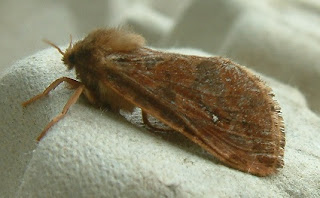I'm pleased because I've not seen it before; although I notice Dave has had one fly to his light - I'm not sure they do that often. This is a male, the female doesn't have wings.
Two moths I captured recently were kind enough to lay me some eggs, not that I asked them.
Birch Mocha:
Vine's Rustic
As can be seen, the Birch Mocha laid its eggs right on the edges of Birch leaves, on the pointy bits of the leaves. The Vine's Rustic, however, despite being eventually supplied with a variety of herbaceous leaves, stubbornly laid them on the surface of the container (except the one in the picture, which was on a Dock leaf). I wonder what it tells us about how they behave in the wild.



















































